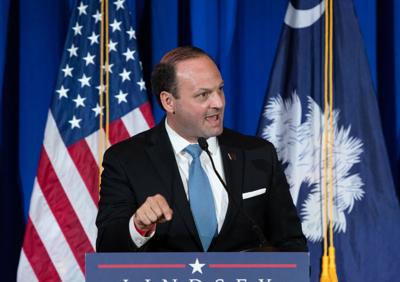S.C. Attorney General Alan Wilson went to extraordinary lengths to distance himself from the lawsuit he filed last week seeking to enforce the Legislature’s prohibition on mask requirements in public schools.
In a brief news release announcing that he had asked the S.C. Supreme Court to stop school districts from requiring masks, Mr. Wilson’s office pointed out that “the lawsuit does not question whether masks are effective or a good idea but is based on the importance of following state law” and noted that “Attorney General Wilson encourages everyone to wear masks when appropriate and encourages anyone who can to get the COVID vaccination.”
However, the news release continued, "The rule of law must prevail.”
It wasn’t just news-release spin. Mr. Wilson even extended his “Don’t blame the messenger” argument into the lawsuit itself, which opens with what sounds almost like an apology: “We understand and respect the concerns that citizens and governments have about the spread of COVID 19 and its variants. This case is not about what policies are best for dealing with the virus. We bring this Petition not to choose sides in debates over health precautions. Instead, we ask this Court to resolve a dispute over the controlling effect of a legislative proviso regarding mask requirements so that all jurisdictions will be informed about what law governs.” He added that “the legislative power is sacrosanct and must be preserved.”
It’s a little difficult to square Mr. Wilson's "just doing my job" argument with his tortured reading of another law that prohibits colleges from having separate mask requirements for vaccinated and unvaccinated students. As evidenced by the recent Supreme Court order in that case, it’s simply not possible for anyone who isn’t trying to find a mask prohibition to read one into that law; for that matter, that's a stretch for most people who are trying to find such a prohibition.
Clearly, Mr. Wilson could have used his discretion to leave this issue alone — just as prosecutors routinely use their discretion not to prosecute certain cases or sorts of crimes. But if he really does now see his job as making sure state and local governments obey the law, whether he likes the law or not, then we’re pretty excited about that, because frankly there’s a lot of lawlessness out there. And yes, although we are pointing out inconsistency here, we're also serious about this point.
Just to pick an example out of the air, he could start by filing a lawsuit to challenge North Charleston’s 2017 annexation of a historically sensitive West Ashley property, which preservationists fear will lead to much more intense development than would have been allowed before the annexation.
Circuit Judge Eugene Griffith Jr. ruled in 2019 that the annexation violated state law, but let it stand because he said only the attorney general had standing to file a lawsuit. In the two years since, Mr. Wilson’s office has declined to respond to multiple attempts from our staff seeking comment on what he plans to do to force North Charleston to obey the rule of law.
That’s certainly not the only case where a local government has violated annexation law or all sorts of other laws but got away with it because only the state has standing to sue.
For that matter, Mr. Wilson could start filing lawsuits over what likely is the most violated law by S.C. state and local governments: the Freedom of Information Act.
And just to pick one of those violations out of the air, he could file suit challenging the Charleston County School Board’s decision earlier this month to kick the public out of its meeting while medical experts briefed it on the spread of COVID-19 infections and how masks can slow that spread. As we noted last week, as much as we agree that we need mask requirements in school, that doesn’t make it OK to violate the law — either the no-mandates law or the Freedom of Information Act.
And yes, we agree with Mr. Wilson that state law prohibits all the efforts we’ve seen so far to require masks in school. The legal questions are whether those laws violate the state constitution and whether it would be legal for a school district to develop and enforce a ban using entirely local or federal funds (which would mean, for instance, that teachers and anyone else whose salary comes in whole or in part from state funds couldn’t be involved) — which no one has tried so far.
The good thing about filing a few FOI lawsuits is that the payoff could be immense. As we noted Sunday, our courts nearly always rule against governments in these cases. The problem is that too often no one files lawsuits challenging governments’ illegal closed-door meetings or their refusal to turn over records as required by law, because there are rarely enough monetary damages (if any) to cover the cost of filing and fighting an FOI lawsuit.
Mr. Wilson could probably find at least one action a week by a school board, city council, county council or state board or commission to challenge in court. Spend a month or two doing that, and other governments would get the message.
















